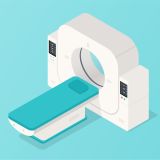In this article:
What is a Magnetic Resonance Imaging Technology Degree?
A magnetic resonance imaging (MRI) technology degree prepares students to become skilled MRI technologists, professionals who use magnetic resonance imaging machines to create detailed images of the inside of the body. These images help doctors diagnose and treat various medical conditions. The degree program teaches students how to operate MRI equipment safely, maintain patient comfort, and ensure high-quality images for accurate diagnoses.
The curriculum typically covers subjects like anatomy, physics of MRI technology, patient care, medical ethics, and safety protocols. Students also receive hands-on training, learning how to position patients properly and adjust MRI settings to capture the best possible images. In addition, students learn to interpret basic results and work alongside doctors and other medical staff to assist in patient care.
Program Options
Students interested in pursuing a career in MRI technology can choose from several educational pathways, depending on their goals and previous experience.
- Associate Degree in MRI Technology: This program provides foundational knowledge in MRI technology, including anatomy, patient care, and MRI safety. It also includes clinical training to ensure students gain hands-on experience before entering the workforce.
- Bachelor’s Degree in MRI Technology: While less common, some schools offer bachelor’s degrees in MRI technology. This program provides a deeper understanding of MRI physics, advanced imaging techniques, and broader medical knowledge, offering opportunities for management or research roles.
- Master’s Degree in MRI Technology: This advanced degree is typically for those looking to specialize further in MRI technology or pursue leadership and administrative roles within medical imaging departments. It may also include opportunities for academic teaching or research.
- Certificate in MRI Technology: This option is typically for individuals who already have a background in healthcare, such as radiologic technologists. It focuses on MRI-specific training and prepares students for certification exams.
Skills You’ll Learn
Students in an MRI technology degree program gain a variety of technical and patient-care skills essential for a successful career in medical imaging. Here are some key skills learned during the program:
- Technical Skills: Students learn how to operate MRI machines, including adjusting settings to capture the best images and ensuring patient safety throughout the scanning process.
- Patient Care: Training includes how to prepare patients for MRI procedures, explain the process to ease their concerns, and ensure their comfort and safety during the scan.
- Anatomy and Physiology Knowledge: A strong understanding of human anatomy is essential for positioning patients correctly and ensuring accurate imaging of the targeted areas.
- Safety Protocols: Students learn how to follow strict safety procedures, such as screening for contraindications like pacemakers and ensuring the MRI environment remains safe for both patients and staff.
- Image Interpretation: Students gain basic knowledge in analyzing MRI images to identify abnormalities and assist physicians in diagnosing conditions, although full image interpretation is typically handled by radiologists.
- Problem-Solving and Critical Thinking: Students develop the ability to troubleshoot equipment issues and adjust techniques to ensure high-quality images and smooth patient experiences.
What Can You Do with a Magnetic Resonance Imaging Technology Degree?
A magnetic resonance imaging technology degree opens up several career opportunities in the healthcare field. Here are some potential career paths:
- MRI Technologist: The most common career path is working as an MRI technologist in hospitals, outpatient imaging centers, or medical clinics. Technologists operate MRI machines, prepare patients for scans, and ensure accurate and safe imaging procedures.
- MRI Specialist: With additional training or certification, MRI technologists can specialize in areas such as musculoskeletal imaging, neuroimaging, or cardiac MRI, providing focused expertise in specific medical fields.
- MRI Supervisor or Manager: Experienced MRI technologists may advance into supervisory or managerial roles, overseeing MRI departments, managing teams of technologists, ensuring quality control, and handling administrative tasks.
- MRI Educator: Some MRI technologists choose to teach in academic programs, training the next generation of imaging professionals. Educators may work in colleges, vocational schools, or healthcare institutions.
- Medical Imaging Researcher: With additional qualifications or experience, MRI technologists may enter research roles, working on the development of new imaging techniques or technologies, contributing to the advancement of medical imaging science.

